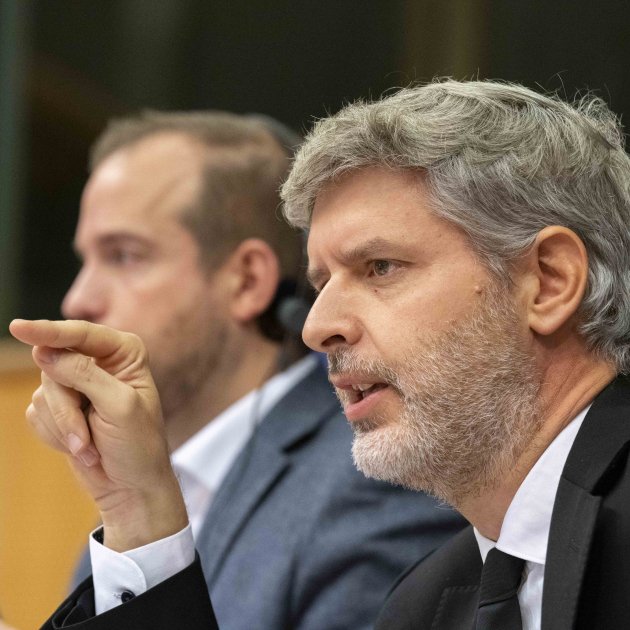Andreu van den Eynde, Catalan lawyer who has been prominent in defending the pro-independence leaders, appeared before the Pegasus committee of the European Parliament this Tuesday to denounce the large-scale cyberespionage known as Catalangate, of which he was one of the 60 known victims - others include independence movement leaders, supporters, family members and professional associates. This Tuesday's monographic session, chaired by MEP Jeroen Lanaers, focused on the use of Pegasus spyware in Spain and included appearances before the committee by several people affected - victims, experts and those accused of authorising it. The investigative journalist Ignacio Cembrero, allegedly spied on by Morocco, appeared, as did cyber security expert Gregorio Martín. In addition, the new director of Spain's National Intelligence Centre (CNI), Esperanza Casteleiro, appointed after the Catalangate scandal broke, and her secretary for digital administration, Juan Jesús Torres Carbonell, also appeared. In the subsequent question period, some MEPs spoke, such as the former Spanish interior minister Juan Ignacio Zoido.
Van den Eynde denounces Catalangate in the European Parliament
During his appearance before the Pegasus Commission, Andreu Van den Eynde, lawyer to Oriol Junqueras, emphasised the state of defenceless he has been left in due to the lack of response from the Spanish state since the first discovery of Pegasus cyberespionage by the state, against the then-speaker of the Catalan Parliament, Roger Torrent. The lawyer celebrated that the European Parliament 's PEGA committee "has gone further" than "any Spanish authority" in investigating violations as serious as client-lawyer confidentiality. By contrast, he denounced the nil progress made by the multiple Spanish courts which had accepted Catalangate complaints: "After half a year, no court in Spain has opened an investigation" to clarify Catalangate, he said. "No action has been taken", he reiterated, "on the other hand, the case at the National Audience (which is investigating the espionage against members of the Spanish government) is moving forward at full speed", he noted. Similarly, he denounced that the Spanish Ombudsman has not given them a response either, and that he has only limited himself to saying that the espionage against 17 people, which the CNI has acknowledged carrying out, was legal. "We are not receiving any help from any Spanish authority," insisted the lawyer.
PEGA committee lets Spanish intelligence head off the hook
Subequently, the new director of Spain's intelligence centre (CNI), Esperanza Casteleiro, appointed after the Catalangate scandal broke, and the Spanish secretary of digital administration, Juan Jesús Torres Carbonell, appeared before the Pegasus committee by digital connection. Esperanza Casteleiro's appearance was the longest of the day, but Casteleiro did not reveal any kind of new information, because she limited herself to reading a prepared speech, explaining the functions of the institution she directs and repeatedly defending that she "works from the strictest observance of the Constitution" and that the intelligence centre is watched over by a specific Congressional committee. The lack of time meant that MEPs had to ask all their questions in succession, which made it easy for the participants to tiptoe around the vast majority of the questions. In particular, Casteleiro did not answered any of the questions raised by MEPs Carles Puigdemont, Jordi Solé or Diana Riba.
